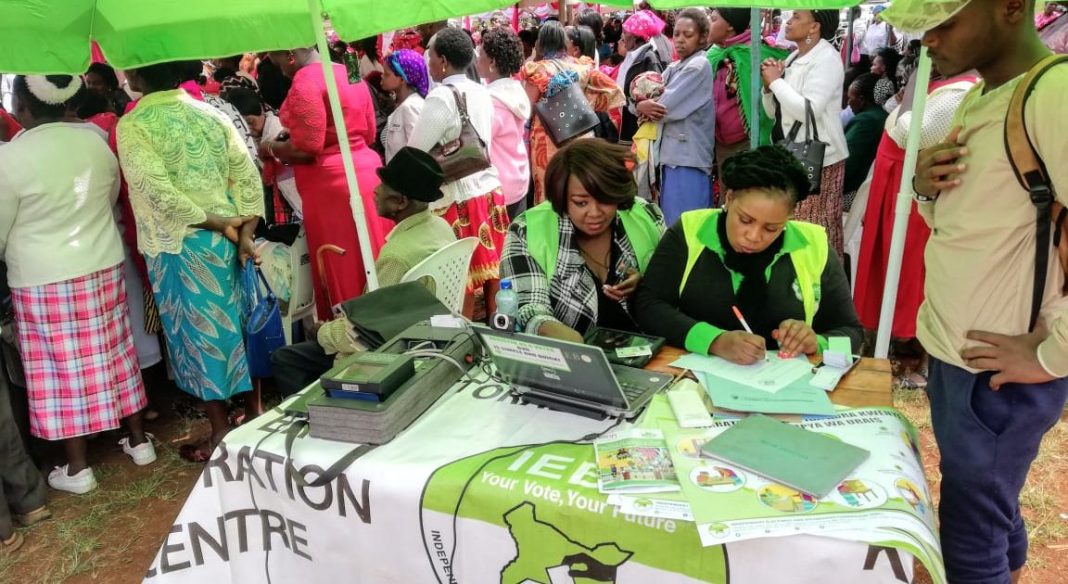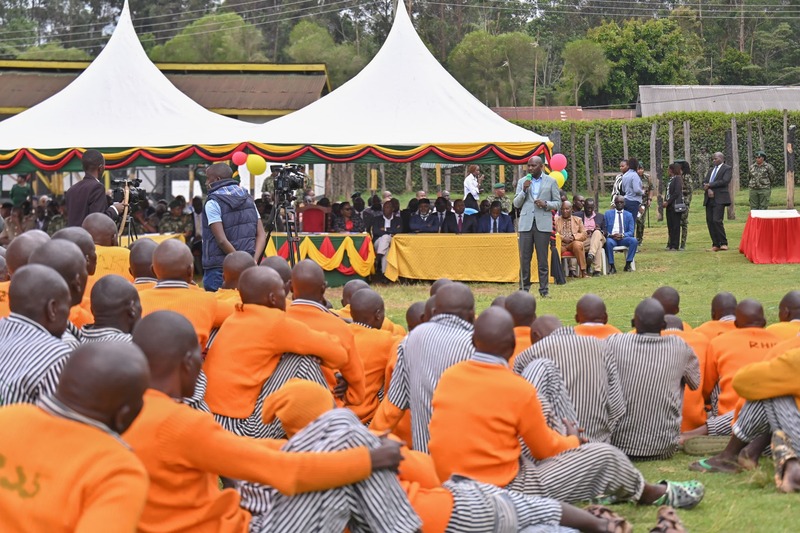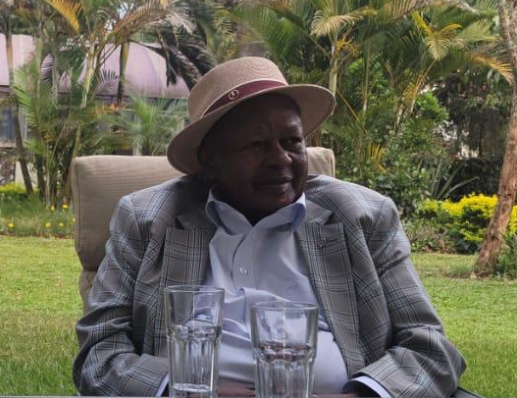The Independent Electoral and Boundaries Commission (IEBC) has rolled out a nationwide mass voter registration drive, targeting 6.3 million new voters ahead of the 2027 General Election.
The campaign, which began on Monday, September 29, 2025, seeks to capture mostly first-time voters, especially young people, whom analysts say could decide the next election. The first launch was held in Kajiado, with similar activities set to run across all 290 constituencies.
Eligible citizens can register at Huduma Centers and designated stations, open Monday to Friday from 8 am to 5 pm. Services include new voter registration, transfers, updates, and verification.
IEBC chairperson Ethekon said the projection of 6.3 million new voters was based on National Registration Bureau records, not census data as in previous years. He added that Sh8 billion of the Commission’s Sh57.3 billion budget for 2027 has been set aside for the exercise, with Sh2.5 billion allocated to stakeholder engagement. Replacement of ageing KIEMS kits will cost Sh7 billion, while system maintenance has been given Sh2.4 billion.
Political leaders have seized on the campaign to rally the youth to participate. Former Deputy President Rigathi Gachagua urged young people to move beyond social media activism and translate their influence into action at the ballot.
“What you are doing on smartphones is good, but the real transformation will happen at the ballot box. The vote is your tool of change. You must register and use it to help restore this country,” he said.
Former Vice President Kalonzo Musyoka and DAP-K leader Eugene Wamalwa echoed similar sentiments, with Wamalwa telling youth that slogans such as “one term” would only carry weight if backed by registration and turnout.
Analysts agree that the youth could be the game-changer in 2027. “For the first time in decades, an election may be decided not by tribal numbers but by a generational uprising at the ballot. If Gen Z turns out in large numbers, they could shape Kenya’s political landscape entirely,” said Prof Tom Nyamache of Turkana University.
The Commission has, however, come under pressure from the Opposition, which has demanded proof of compliance in procurement processes, including contracts with Smartmatic and other technology providers. Ethekon assured the public that concerns on data protection and procurement had been addressed, with policies now in place to safeguard operations.
In its post-election review after the 2022 polls, IEBC noted that while youth made up 40 per cent of registered voters, turnout remained low. Out of 22.1 million registered voters, only 14.3 million cast their ballots, a factor analysts say was key in President William Ruto’s narrow victory over Raila Odinga.
To qualify, voters must be Kenyan citizens aged 18 and above, hold a valid national ID or passport, and not be previously registered. Those convicted of election offences in the last five years or declared of unsound mind remain ineligible. Diaspora voters must register using passports, except East Africa–based Kenyans who may use national IDs.
“A credible register is central to free and fair elections, and every citizen’s participation strengthens democracy,” Ethekon said, emphasizing that the future of Kenya lies in the hands of its young people.







Hmm it looks like your site ate my first comment (it was super long) so I guess I’ll just sum it up what I submitted and say, I’m thoroughly enjoying your blog. I too am an aspiring blog writer but I’m still new to everything. Do you have any tips and hints for first-time blog writers? I’d definitely appreciate it.
online casinos paypal
References:
http://www.summerband.co.kr/bbs/board.php?bo_table=qa&wr_id=345974
online casino mit paypal
References:
ww.enhasusg.co.kr
Identify suppliers that are debarred from participating in government procurement.
EGP helps to ensure the provision of equal treatment
to all bidders, applying same rule of law, increase accountability
of participants in the procurement process and at the same time raising awareness on the
general public about the expenses of the government.
French-English dictionary, translator, and learning Spanish-English dictionary,
translator, and learning
The Italic form ⟨ɑ⟩, also called script a, is often used in handwriting;
it consists of a circle with a vertical stroke on its right.
The latter form is commonly used in handwriting and fonts based on it, especially
fonts intended to be read by children, and is also found in italic type.
Before a vowel sound an is usual These are due to fronting, that is to say,
pronouncing the sound more toward the front of the mouth, or to rounding, slightly rounding the lips,
which has the effect of causing the sound to be pronounced higher in the mouth.
The name of the letter in the Phoenician period resembled the Hebrew name aleph meaning “ox”;
the form is thought to derive from an earlier symbol resembling the head of an ox.
Once you receive the supplier registration approval notification, as a registered supplier, you can participate in public procurement.
References:
https://blackcoin.co/velvet-spin-casino-a-comprehensive-review/
Discover the exclusive Skycrown Casino bonus, designed to give new players a strong start.
The main gift we are glad to give to our new players is SkyCrown Casino generous welcome package that brings perks of the first four deposits.
Players can use live chat for immediate assistance,
email for detailed inquiries, or phone support for direct conversations.
Game return-to-player percentages are publicly available and meet industry standards, giving players
fair winning opportunities. The minimum deposit amount remains reasonable,
with withdrawals typically processing within hours depending on the chosen method.
High rollers are also catered for with special monthly bonuses and tailored rewards.
Selecting the right casino is about matching the platform to your style.
When it comes to withdrawals, we don’t believe in waiting games.
By following safe play habits and reaching out for help when needed, you
can make sure your experience stays positive
and balanced. Responsible gambling means staying in control,
keeping play fun, and knowing when to stop. If you ever feel that
gambling is becoming a problem, support is available.
Spin the reels at Skycrown casino with games from industry giants known for bulletproof security
protocols and certified fairness testing. The casino section organizes games using intuitive
filters for straightforward navigation between categories.
International gambling laws require licensed operators to verify player identities.
Completing Skycrown registration unlocks the full gaming library
featuring over 6000 slots and table games. Fast loading speeds between sections keep players engaged while exploring.
Skycrown Casino offers a comprehensive gambling experience with
a Curaçao license established in 2022.
References:
https://blackcoin.co/best-no-deposit-bonuses-2025-the-ultimate-guide/
Sie erhalten 100% bis zu 100 € plus 50 Freispiele bei Ihrer ersten Einzahlung.
Willkommensbonus Der Willkommensbonus ist unsere Art, Ihnen für Ihren Beitritt zu danken. Letztendlich
besteht das Ziel darin, ein nahtloses und angenehmes Spielerlebnis zu bieten,
das die Spieler dazu bringt, immer wieder zurückzukommen.
Wir bieten eine breite Palette von Spielen, darunter Slots, Tischspiele, Live-Casino und möglicherweise Crash-/Plinko-Spiele,
von führenden Softwareanbietern wie NetEnt, Microgaming, Evolution Gaming,
Pragmatic Play und Red Tiger. Im Conti Casino setzen wir uns dafür ein, ein sicheres Spielumfeld zu bieten. Im Conti Casino
setzen wir uns dafür ein, allen unseren Spielern ein sicheres und angenehmes Spielerlebnis zu bieten. Behalte deine Gewinne und Verluste im Auge,
um informierte Entscheidungen darüber zu treffen, wann du
auszahlen oder weiterspielen möchtest. Entscheide dich für Spielautomaten, Tischspiele
oder Live-Casino-Optionen, die dir das beste Preis-Leistungs-Verhältnis bieten. Je mehr Sie spielen, desto höher wird Ihr
Rang und desto besser werden die Belohnungen!
References:
https://online-spielhallen.de/vegaz-casino-aktionscode-vorteile-nutzung-und-wichtige-informationen/
29oy2m
safmv1